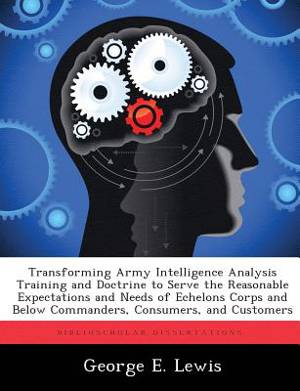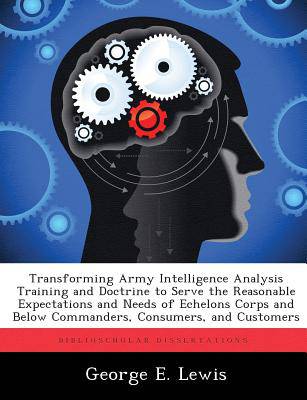
- Afhalen na 1 uur in een winkel met voorraad
- Gratis thuislevering in België vanaf € 30
- Ruim aanbod met 7 miljoen producten
- Afhalen na 1 uur in een winkel met voorraad
- Gratis thuislevering in België vanaf € 30
- Ruim aanbod met 7 miljoen producten
Zoeken
Transforming Army Intelligence Analysis Training and Doctrine to Serve the Reasonable Expectations and Needs of Echelons Corps and Below Commanders, Consumers, and Customers
George E Lewis
Paperback | Engels
€ 78,95
+ 157 punten
Omschrijving
The art and science of military intelligence analysis has been scrutinized for its accuracy and value since the beginning of warfare. With every advance in technology and information processing, the delta between the trained cognitive capabilities of analysts and the data they collect has widened. In recent history, intelligence operations and training have more often than not focused on automated tools and processes, but very few efforts have been made to measurably improve the reasoning abilities of intelligence analysts and leaders. Now, when faced with modern day adaptive and complex asymmetric threats, the need for human analysis has risen to the forefront, but Army Intelligence is ill equipped to deliver what commanders and consumers need at the tactical and operational levels. In order to effectively answer the question of what core competencies Army intelligence analysts need to meet the contemporary needs of commanders, a survey of doctrinal requirements must first be performed. Amongst doctrine the term predictive intelligence is used frequently to identify what analysts must do to support commanders, but no definition is readily available in the Joint or Army lexicon. Once a definition is established it is applied to the contemporary operating environment from whence an understanding of reasonable commander's needs is separated from unrealistic wants. Thus the purpose and vantage point of this study is cemented and the analysis can proceed. To understand what changes in doctrine and training might be necessary to meet commanders needs, an understanding of the recent evolution of Army analytic training for both enlisted soldiers and officers must be conducted. A crosswalk between doctrine, doctrinal training requirements, and recent training practices is performed to analyze how prediction has been addressed in past training and why it has proven to be inadequate to meet the needs of commanders. The essence and nature of prediction in war is then examined
Specificaties
Betrokkenen
- Auteur(s):
- Uitgeverij:
Inhoud
- Aantal bladzijden:
- 64
- Taal:
- Engels
Eigenschappen
- Productcode (EAN):
- 9781288325856
- Verschijningsdatum:
- 21/11/2012
- Uitvoering:
- Paperback
- Formaat:
- Trade paperback (VS)
- Afmetingen:
- 189 mm x 246 mm
- Gewicht:
- 131 g

Alleen bij Standaard Boekhandel
+ 157 punten op je klantenkaart van Standaard Boekhandel
Beoordelingen
We publiceren alleen reviews die voldoen aan de voorwaarden voor reviews. Bekijk onze voorwaarden voor reviews.











